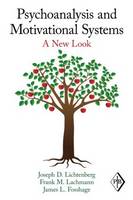Psychoanalysis and Motivational Systems: A New Look

Book Details
- Publisher : Routledge
- Published : 2011
- Cover : Paperback
- Pages : 160
- Category :
Psychoanalysis - Catalogue No : 30133
- ISBN 13 : 9780415883238
- ISBN 10 : 0415883237
Reviews and Endorsements
'The motivational systems theory advanced by Lichtenberg, Lachmann, and Fosshage has provided clinicians with invaluable tools for tracking the unfolding of affects, intentions, goals, and mental states within the therapeutic relationship. The present volume offers a welcome new look at this theory and its clinical implications from the perspective of nonlinear dynamic systems theory. Complex psychological phenomena - such a love and hatred, selfhood and identity, and creativity - are shown to emerge from the fluidly shifting interplay of multiple motivational systems, always complexly embedded in a nexus of relational contexts. Psychoanalytic therapists at all levels of experience will find this guiding framework to be immensely helpful in their clinical work.'
- Robert D. Stolorow, Ph.D., author, Trauma and Human Existence
'As psychoanalysis moved from an exclusively one-person model to that of an irreducible intersubjective relational model, it became necessary to construct a new metatheory to encompass this change and replace that of the former. The formulations put forward in this new work by Lichtenberg, Lachmann, and Fosshage convincingly fills that void. The metatheory they propose centers around the newer concept of 'intention' replacing 'need' as 'first cause' and as the activation of a 'motivational system.' The development of the motivational system follows the unique, unpredictable pattern of 'emergence,' a component of complexity, a nonlinear dynamic theory. Their metatheory consists of five points of view: influences, intentions, inferences, communications, and regulations. Their invocation of the concept of fractals to comprehend the experience of continuity of identity along different scales of mind is both innovative and exciting. The authors have constructed a metatheory within a larger and smaller theory - like Russian dolls - all regulated both spontaneously from within and under the influence of an overarching metatheory, all based on human experience. I found the authors' work to be exciting, innovative yet pragmatic, and refreshing. It is a most welcome advance to the psychoanalytic literature and holds great promise for the future.'
- James S. Grotstein, M.D., Training and Supervising Analyst, Psychoanalytic Center of California

